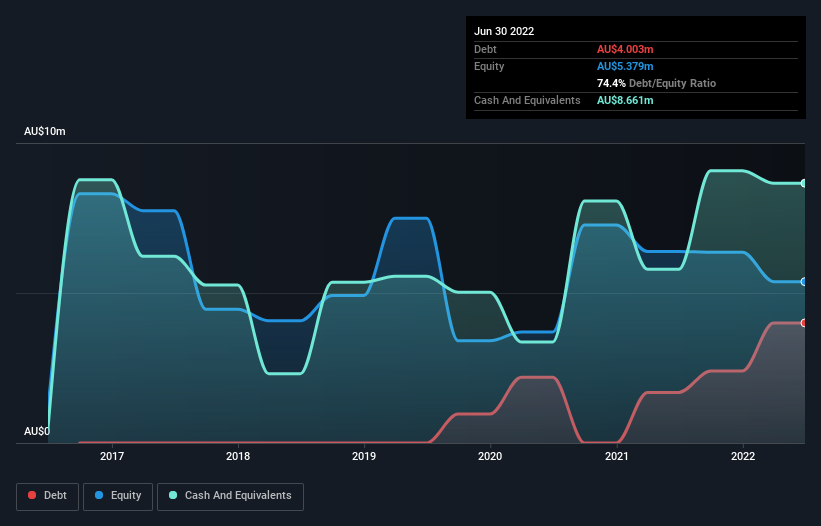
Legendary fund manager Li Lu (who Charlie Munger backed) once said, 'The biggest investment risk is not the volatility of prices, but whether you will suffer a permanent loss of capital.' So it seems the smart money knows that debt - which is usually involved in bankruptcies - is a very important factor, when you assess how risky a company is. We note that AdAlta Limited (ASX:1AD) does have debt on its balance sheet. But is this debt a concern to shareholders?
Why Does Debt Bring Risk?
Debt is a tool to help businesses grow, but if a business is incapable of paying off its lenders, then it exists at their mercy. Ultimately, if the company can't fulfill its legal obligations to repay debt, shareholders could walk away with nothing. However, a more common (but still painful) scenario is that it has to raise new equity capital at a low price, thus permanently diluting shareholders. Having said that, the most common situation is where a company manages its debt reasonably well - and to its own advantage. When we examine debt levels, we first consider both cash and debt levels, together.
View our latest analysis for AdAlta
What Is AdAlta's Debt?
The image below, which you can click on for greater detail, shows that at June 2022 AdAlta had debt of AU$4.00m, up from AU$1.69m in one year. However, its balance sheet shows it holds AU$8.66m in cash, so it actually has AU$4.66m net cash.

A Look At AdAlta's Liabilities
Zooming in on the latest balance sheet data, we can see that AdAlta had liabilities of AU$3.63m due within 12 months and liabilities of AU$1.64m due beyond that. Offsetting this, it had AU$8.66m in cash and AU$1.67m in receivables that were due within 12 months. So it actually has AU$5.06m more liquid assets than total liabilities.
This excess liquidity is a great indication that AdAlta's balance sheet is almost as strong as Fort Knox. On this view, lenders should feel as safe as the beloved of a black-belt karate master. Succinctly put, AdAlta boasts net cash, so it's fair to say it does not have a heavy debt load! There's no doubt that we learn most about debt from the balance sheet. But you can't view debt in total isolation; since AdAlta will need earnings to service that debt. So if you're keen to discover more about its earnings, it might be worth checking out this graph of its long term earnings trend.
In the last year AdAlta had a loss before interest and tax, and actually shrunk its revenue by 31%, to AU$2.8m. To be frank that doesn't bode well.
So How Risky Is AdAlta?
By their very nature companies that are losing money are more risky than those with a long history of profitability. And the fact is that over the last twelve months AdAlta lost money at the earnings before interest and tax (EBIT) line. Indeed, in that time it burnt through AU$4.1m of cash and made a loss of AU$6.1m. With only AU$4.66m on the balance sheet, it would appear that its going to need to raise capital again soon. Overall, its balance sheet doesn't seem overly risky, at the moment, but we're always cautious until we see the positive free cash flow. The balance sheet is clearly the area to focus on when you are analysing debt. However, not all investment risk resides within the balance sheet - far from it. To that end, you should learn about the 4 warning signs we've spotted with AdAlta (including 2 which are potentially serious) .
If, after all that, you're more interested in a fast growing company with a rock-solid balance sheet, then check out our list of net cash growth stocks without delay.
New: Manage All Your Stock Portfolios in One Place
We've created the ultimate portfolio companion for stock investors, and it's free.
• Connect an unlimited number of Portfolios and see your total in one currency
• Be alerted to new Warning Signs or Risks via email or mobile
• Track the Fair Value of your stocks
Have feedback on this article? Concerned about the content? Get in touch with us directly. Alternatively, email editorial-team (at) simplywallst.com.
This article by Simply Wall St is general in nature. We provide commentary based on historical data and analyst forecasts only using an unbiased methodology and our articles are not intended to be financial advice. It does not constitute a recommendation to buy or sell any stock, and does not take account of your objectives, or your financial situation. We aim to bring you long-term focused analysis driven by fundamental data. Note that our analysis may not factor in the latest price-sensitive company announcements or qualitative material. Simply Wall St has no position in any stocks mentioned.
About ASX:1AD
AdAlta
A clinical stage biotechnology company, discovers and develops protein and cell-based therapeutics by its i-body platform in Australia.
Excellent balance sheet slight.
Market Insights
Community Narratives




